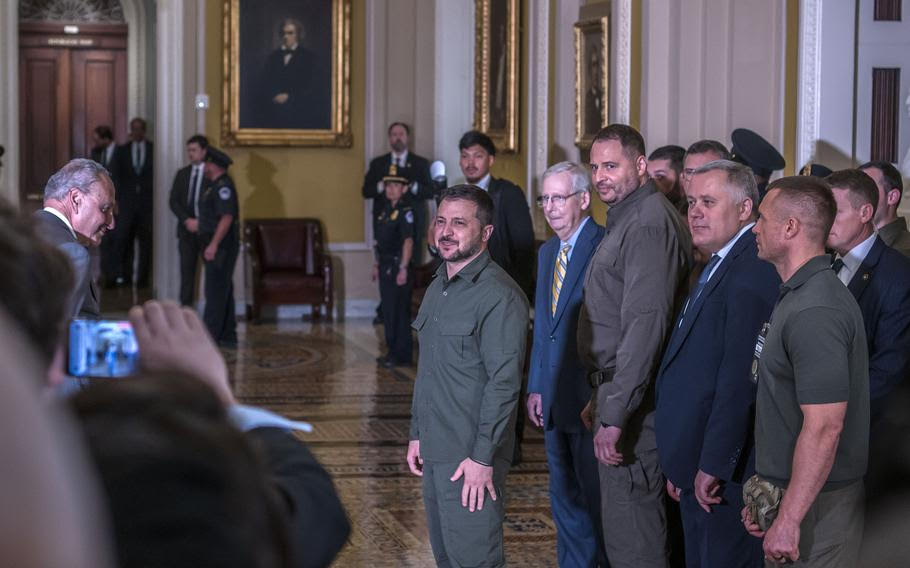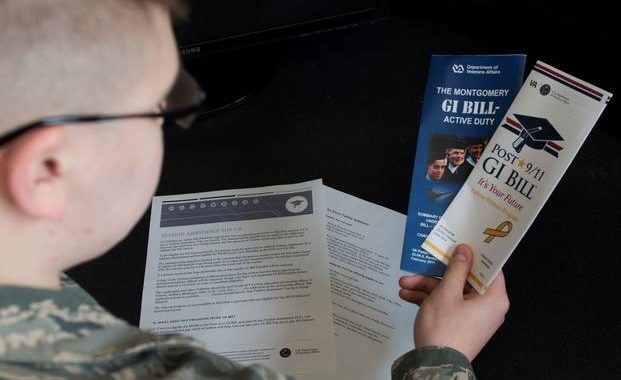New danger for Ukraine: Taking Israel’s side in war against Hamas and Gaza


Ukraine President Volodymyr Zelenskyy stops for a moment to say a few words after leaving the Senate Chamber on Sept. 21, 2023, on Capitol Hill in Washington.
KYIV — Ukraine President Volodymyr Zelenskyy’s immediate and forceful support for Israel in its fight against Hamas has imperiled almost a year of concerted efforts by Kyiv to win the support of Arab and Muslim nations in its war against Russia.
Zelenskyy’s early statements backing Israel after the surprise attack by Hamas, in which more than 1,400 Israelis were killed, helped Ukraine stay in the international spotlight, and placed it firmly on the side of the United States.
Zelenskyy’s position also drew attention to the increasingly close relationship between Russia and Iran, which is a main sponsor of Hamas, a sworn enemy of Israel, and also an important supplier of drones and other weapons for Moscow.
Hamas and Russia are the “same evil, and the only difference is that there is a terrorist organization that attacked Israel and here is a terrorist state that attacked Ukraine,” Zelenskyy said in a speech to NATO’s Parliamentary Assembly on Oct. 9.
But with Israel’s military operation set to enter its fourth week, and Palestinian civilian casualties mounting, the war in Gaza is posing one of the most difficult diplomatic tests for Ukraine since Russia’s invasion in February 2022.
Countries like Turkey, Saudi Arabia and Qatar, which at times have provided crucial support to Ukraine, have accused the West of double standards in Gaza, alluding to the broad condemnation of civilian deaths in Ukraine compared with the muted criticism of Israel.
Tension with Muslim and Arab nations, however, is just one risk facing Kyiv, which must now also contend with the world’s attention shifting largely to new war in the Middle East, as well as competing demands for U.S. military support at a time when House Republicans just elected a new speaker, Mike Johnson (La.), who has opposed sending additional aid to Ukraine.
Some experts noted that Israel had already made clear it was not going to reciprocate with greater support for Ukraine.
Randa Slim, an expert in peace-building at the Middle East Institute, said Israel had no choice but to maintain its relationship with Moscow, in part because of Russia’s control over Syria, and she pointed out that Israel had rejected Zelenskyy’s offer to visit after the Hamas attack.
Zelenskyy’s pro-Israel position “did not make sense,” Slim said, adding that many Arab and Muslim countries see more similarities between Israel and Russia — as aggressive military powers — than they do between Israel and Ukraine.
“This is where the Arab region is,” she said. “They are not going to accept what Biden says, comparing Russia and Hamas. They are more comparing Russia and Israel as far as death toll and as far as targeting civilians.”
Zelenskyy, she said, could win more friends if he was “ready to say what Russia is doing in Ukraine is what Israel is doing in Gaza.” But, she added, “I don’t see Ukraine ready to do that or willing to do that.”
Just as Russian President Vladimir Putin initially offered no direct condolences to Israel and no firm rebuke of Hamas, Zelenskyy was slow to speak about the need to protect Palestinian civilians in Gaza as Israel stepped up retaliatory airstrikes.
When news of the Hamas attack first hit, Zelenskyy and members of his team compared Hamas to Russia, saying Ukrainians had “a special understanding about what is happening” to Israelis. (There are large numbers of Ukrainian and Russian immigrants living in Israel.)
Only 10 days later did Zelenskyy indirectly allude to the bombardment of Gaza by calling for the need to protect civilians and for deescalation.
Meanwhile, Zelenskyy has steered clear of criticizing Israeli strikes, despite the deaths in Gaza of thousands of Palestinian civilians and at least 21 Ukrainian citizens.
The foreign ministers of Turkey and Qatar, which have played instrumental roles in negotiating between Ukraine and Russia on issues like prisoner-of-war exchanges and Russia’s blockade of Ukrainian grain exports, issued a joint statement alleging Western hypocrisy.
“It is not permissible to condemn the killing of civilians in one context and justify it in another,” said Qatar’s Mohammed bin Abdulrahman al-Thani. Turkey’s Hakan Fidan added that the West’s failure to condemn the killings in Gaza “constitutes a very serious double standard.”
In an interview with CNN, Queen Rania of Jordan also offered sharp criticism: “Are we being told that it is wrong to kill a family, an entire family, at gunpoint, but it’s okay to shell them to death?”
Other experts said Zelenskyy’s efforts to draw comparisons were unlikely to resonate with Arab countries.
Ukraine “has never been at the forefront” for the Arab world, said Kristian Ulrichsen, a fellow at Rice University who has written on Ukraine-Arab relations. “It is a conflict that does not concern them.”
Ulrichsen added, “Israel is taking up so much bandwidth that I don’t think anybody in the Middle East really is thinking about Ukraine right now.”
This weekend, Ukraine was scheduled to host a third round of talks aimed at fostering global support for its “peace plan” — which calls for a unilateral withdrawal of Russian troops from occupied Ukrainian territory and full restoration of Ukraine’s territorial sovereignty.
Unlike at the first Ukraine peace formula meeting in August, which was hosted by Saudi Arabia in Jeddah and attended by delegates from almost all the major unaligned powers, it was unclear if Saudi officials would attend this weekend’s event in Malta.
Zelenskyy spoke Monday with Saudi Crown Prince Mohammed bin Salman, and in a readout of the call issued by Riyadh, there was no mention of the Malta conference or further help for Ukraine.
China, which in recent days has joined Russia in calling for a return to a two-state solution to settle the Israeli-Palestinian conflict, was not attending the Malta event, Bloomberg News reported.
Turkey was planning to send a delegation to Malta, but in recent days Turkish President Recep Tayyip Erdogan has spoken out forcefully against Israel and has described Hamas as a resistance movement — a stark contrast to Zelenskyy’s stated positions.
With Russia stepping up attacks on the eastern front, Ukraine can hardly afford to lose any friends. This is especially true given increasing opposition by Republicans in Congress to sending more aid to Ukraine.
President Biden has proposed an additional $60 billion in assistance for Ukraine, and in a recent speech tied that to increased funding for Israel and for strengthening border protection in the United States.
But the White House must now deal with Johnson, the new House speaker, who has repeatedly voted against further Ukraine funding and told Fox News he intends to separate funding for Ukraine from the assistance to Israel.
Johnson has said Washington will not abandon Ukraine but has questioned the White House’s ultimate goals. Meanwhile, in Europe, Hungarian Prime Minister Viktor Orban, who recently met Putin on the sidelines of a conference in China, is trying to shoot down a 50 billion-euro aid proposal for Ukraine from the European Union.
The E.U. package will be voted on in December as part of the bloc’s 2023-2027 budget and requires the unanimity of the 27 member countries to be approved.
Tymofiy Mylovanov, a former Ukrainian economy minister, expressed confidence that Zelenskyy’s administration would come up with a plan to re-boost international support for Ukraine and maintain attention on the war in the short to medium term.
Ukraine’s Foreign Ministry, the Ukrainian presidential administration and a spokesperson for Zelenskyy did not respond to requests for comment on what their plan might entail.
Ukraine, meanwhile, has been preparing for the possibility that U.S. support will taper off, according to Orysia Lutsevych, director of the Ukraine program at Chatham House, a London-based think tank.
Ukraine’s “Plan B” — evidenced by recent joint ventures with German and Turkish arms companies as well as talks with British and American manufacturers — is to distance itself as much as possible from external foreign politics, Lutsevych said.
“If America completely abandons Ukraine, it would be very difficult,” Lutsevych said. “But Ukraine will keep fighting with the resources it has on its own and it has from European allies.”




